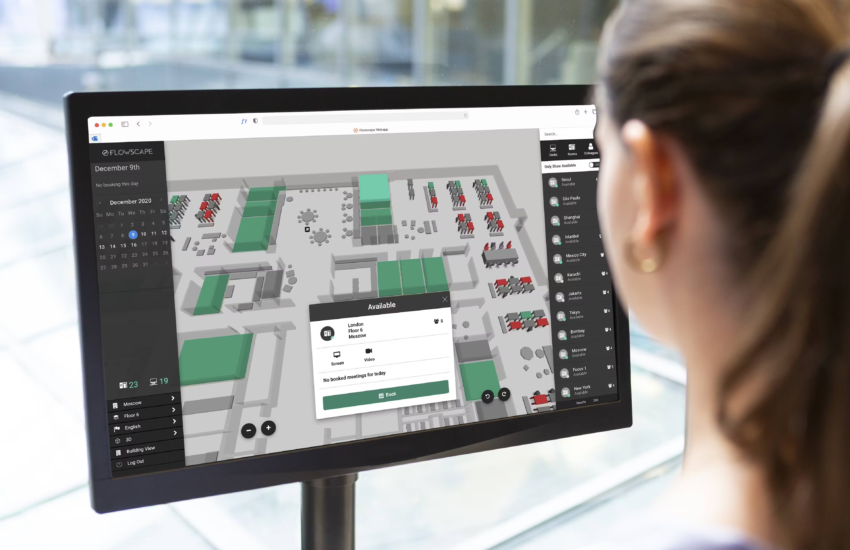The efficient use of physical space is a critical factor that directly influences productivity, collaboration, and overall operational success of businesses today. Space management software systems have emerged as indispensable tools for organizations seeking to maximize the potential of their environments.
In what ways are space management systems advantageous? How can space management software improve a workspace?
- Maximizing Space Utilization
One of the primary advantages of space management software systems is their ability to maximize the utilization of available space. These systems provide real-time insights into how spaces are used, helping organizations identify underutilized areas or spaces that can be repurposed for better efficiency.
By optimizing the allocation of space, businesses can enhance overall productivity and make better use of their physical resources.
- Strategic Space Planning
Space management software empowers organizations to engage in strategic space planning. With data-driven insights, decision-makers can plan and allocate spaces based on actual usage patterns, team dynamics, and workflow requirements.
This strategic approach ensures that each square foot of space is utilized effectively, aligning with the organization’s goals and objectives.
- Improved Collaboration and Communication
By visualizing space usage and allocation, these software systems facilitate improved collaboration and communication within teams. Departments can better understand each other’s spatial needs, fostering a collaborative environment that enhances cross-functional interactions.
This transparency in space utilization also aids in avoiding conflicts over space allocation and encourages a more cohesive workplace culture.
- Flexibility and Adaptability
Software systems designed for space management purposes offer a high degree of flexibility and adaptability. As organizational needs evolve, these allow for quick adjustments to space configurations.
Whether accommodating new hires, creating collaborative spaces, or reorganizing departments, the software ensures that space can be adapted to meet the changing demands of the business environment.
- Cost Savings
Efficient space management directly translates into cost savings. By optimizing space utilization, organizations can potentially reduce their real estate footprint, leading to lower leasing costs.
Also, a well-managed space reduces the need for unnecessary expansions or relocations, saving on associated costs. The financial benefits of a space management system extend beyond immediate savings to long-term operational efficiency.
- Enhanced Employee Experience
A thoughtfully managed workspace contributes to a positive employee experience. Space management software allows organizations to create environments that cater to the needs and preferences of their workforce.
Whether it’s designing comfortable break-out areas, collaborative spaces, or quiet zones, the ability to tailor the workspace enhances employee satisfaction, engagement, and overall well-being.
- Data-Driven Decision-Making
This type of software provides organizations with valuable data and analytics on how spaces are used. This data becomes a powerful tool for decision-makers, enabling them to make informed choices about space planning, resource allocation, and future investments.
Data-driven decision-making ensures that changes are based on real insights, optimizing the effectiveness of space management strategies.
- Compliance and Reporting
In many industries, compliance with space regulations and building codes is crucial. Fortunately, these software systems often come equipped with reporting features that aid organizations in demonstrating compliance.
This not only mitigates risks associated with regulatory issues but also ensures that the workspace is designed and utilized in accordance with industry standards.
- Sustainability and Green Practices
Being able to efficiently manage a given space aligns with sustainability goals. By reducing the overall space footprint and optimizing energy usage within workspaces, organizations contribute to environmentally friendly practices.
A space management system can provide insights into how spaces impact energy consumption, allowing organizations to implement eco-friendly initiatives and reduce their carbon footprint.
- Streamlined Move Management
When organizations undergo relocations or expansions, managing the logistics of moving can be a complex process. Having this type of software system can streamline move management by providing a centralized platform for planning and executing moves.
As a result, there is a smooth transition, minimizing disruptions to ongoing operations and maintaining continuity in business activities.
The implementation of space management software systems can transform how organizations make decisions regarding their physical environments. It offers many advantages, from maximizing space to cutting costs.
As businesses continue to evolve, the ability to adapt and optimize workspace becomes a critical factor in achieving long-term success. If they can embrace space management software, they can surely reap the benefits. They should treat it not only as a tool but also as a business strategy that helps organizations achieve their goals.

